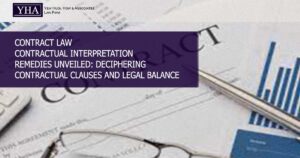
CONTRACT LAW – CONTRACTUAL INTERPRETATION REMEDIES UNVEILED: DECIPHERING CONTRACTUAL CLAUSES AND LEGAL BALANCE
This legal updates explore the principles governing the interpretation of agreements, emphasizing the importance of clarity and unambiguity in contractual terms. It delves into a key issue involving restrictions on remedies for breach of contract, shedding light on the court’s commitment to upholding plain meanings. The illustrative scenario involving shareholders X and Y dissects a pertinent clause, showcasing the delicate balance between restricting remedies and ensuring fairness in legal proceedings.

